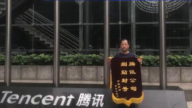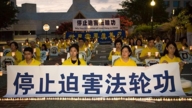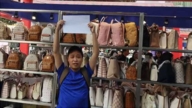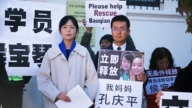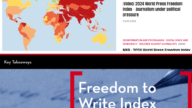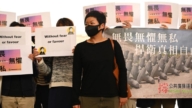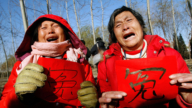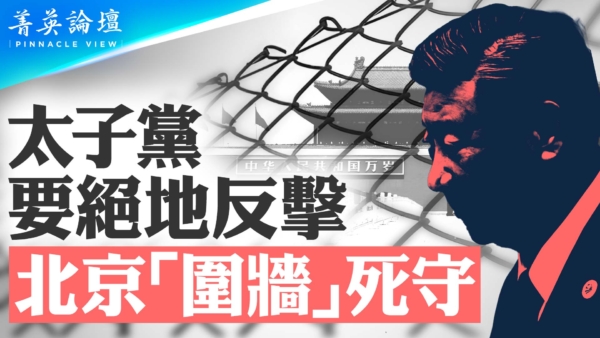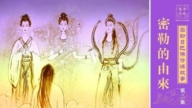【新唐人2013年01月02日訊】大陸門戶網站《騰訊網》刊文回顧2012年,並向中國一群拒絕向強權與獨裁妥協的「反對者」致敬,說他們義舉令人佩服,並暗示「當民眾被『逼到牆角』,惟有『反對』才可能破牆而出。」 文章發出後,引發網民的熱評和轉載,但是,文章當天被刪除,目前中國四大微博也禁止搜索這篇文章。
《騰訊》新聞「2012年終策劃:致敬十大反對者」,這篇文章指出,能不畏強權、捍衛自由價值的人,總是讓人格外尊敬。因為他們的堅持,才讓強權政府無法肆無忌憚﹔因為他們的毅力,才讓社會公義復活甦醒。
文章表示,2012年,中國就有這樣一群拒絕向強權與體制妥協的「反對者」。文中提到的十大「反對者」包括:
一,不公選舉的反對者——烏坎村民。2011年廣東烏坎事件,數萬民眾抗議村官貪腐,經過3個月的血淚抗爭,終於爭取到一人一票的「民主」選舉。
二,決策不透明的反對者——什邡、啟東市民。四川甚邡兩萬民眾抗議高污染鉬銅項目,面對當局的暴力鎮壓,一群中學生喊出:「為了什邡,我們可以犧牲,我們是90後」﹔而江蘇南通啟東數萬民眾,抗議紙廠排污管道修建計劃,他們衝進市政府,扒掉市委書記的上衣。最後兩地政府都選擇了妥協。
三,洗腦的反對者——香港市民。香港萬民反「洗腦」,9月初,香港一名15歲少年,帶領一群中學生,反對已排上日程的「國民教育科」,隨後得到家長及眾多市民聲援,12萬香港市民包圍政府總部,最後港府妥協。
四,言論管制的反對者——任建宇。因轉發微博,被勞教兩年的重慶網民任建宇,被提前釋放後,起訴重慶勞教所,並在網路上推動廢除勞教制度。
五,教育權不公反對者——佔海特。江西籍上海女孩佔海特,5月在微博上公開爭取異地考試權利,她把數百萬學生無法在非戶籍地參加考試的現實,推到輿論的焦點。
六,計劃生育反對者——楊支柱。中國青年政治學院法律系副教授楊支柱,因妻子懷第二胎遭學校解聘,並被迫上繳24萬多元的超生費,他撰文批「計生政策」,並以「賣身交罰款」等行為藝術進行抗爭。
七,平墳運動反對者——趙克羅。河南政協常委趙克羅,在微博炮轟平墳運動。
八,有毒食品反對者——吳恆。「擲出窗外」網站的創辦人吳恆,揭露中國有毒食品氾濫的社會殘酷現實。
九,商業霸權反對者——羅永浩。網民羅永浩反對西門子商業霸權,兩次舉辦「砸冰箱秀」。
十,一切不公的反對者——全體網民。全體網民在網路的每個角落吶喊、抵抗社會上的一切不公,並曝光了大量「錶哥錶叔」、「房嬸房叔」,扳倒一批貪官、淫官,嚇得官媒日批網路14天。
法學家、中國問題研究專家趙遠明:「很多都是某些地方,政府或者政府官員,對政策的制定或者是政策的執行,都可以說是違法的,所以激起了人民的不滿,產生很多抗爭,對統治者的反對。所以這些情況的出現,實際主要根源在於中共的獨裁統治,像各官員,各地方貪腐,所以引起社會的反抗。」
「致敬十大反對者」一文發出後,當天在騰訊、百度貼吧等網站就被刪除。目前在網易、新浪等四大微博上也被禁止搜索。
北京時政觀察人士華頗:「中國的執政者傳統來說,就是願意中國的民眾當順民,就是政府怎麼說,他們就怎麼做,不能夠提出自己的願望,所以這10個人物和群體,絕對不能成為官方要宣傳的對像,所以官方必然要封殺,免得越來越多的人向這些人看齊。」
中國問題研究專家趙遠明還指出,這種對暴政的反抗,在社會上有很強的民眾基礎,隨著中共獨裁統治的加劇,相信這種抗議會越來越普遍。
採訪編輯/李韻 後製/鍾元
CCP Bans ‘2012 Review: Tribute to the Top 10 Opponents’
Tencent.com, a popular Chinese portal website,
published a review article about 2012.
The author honored those “opponents” who resisted
compromising with the Chinese Communist Party’s (CCP) dictatorship, saying “their righteous acts are admirable.”
The article also suggests, when the civilians are cornered,
the only way to break out is to become “an opponent.”
Since being published, the article has been actively
discussed and cited by many Chinese netizens.
However, it was deleted a day after its publication and it is
banned for search on the four major microblog sites in China.
The news channel of Tencent.com published an article,
titled, “2012 Review: Tribute to the Top 10 Opponents.”
The article said, those who uphold the value of protecting
the freedom against power deserve our respect;
it is their perseverance that stops
the brazen behavior of the government;
it is their willpower that awakens
the sense of justice in our society.
The article lists individual or group “opponents” in China,
who refuse to yield to CCP’s pressure and dictatorship.
The full list of the 10 most important “opponents” follows.
First, the opponents of unfair elections,
the Wukan villagers.
In 2011, tens of thousands of villagers in Wukan,
Guangdong Province protested against corrupt officials.
After struggling for over three months, the village election
was finally held in a democratic manner in 2012.
Second are the opponents of the non-transparent
policy decisions, the residents of Shifang and Qidong.
Over twenty thousand residents of Shifang City, Sichuan
Province protested against the highly polluting molybdenum copper project.
When confronted by the violent CCP’ regime suppression,
a group of middle school students shouted out, “We are post 90’s and we are ready to sacrifice ourselves for our city.”
In Qidong, Jiangsu province, tens of thousands of residents
protested against constructing a waste discharge plant.
They rushed into the municipal building,
and stripped the clothes of the city’s CCP secretary.
At the end, both city governments chose to compromise
with the residents.
Third in the list are the opponents of CCP’s brainwashing
education, the people of Hong Kong.
In early September, a 15-year-old boy led a group of middle
school students to protest against the proposed curriculum of “Moral and National Education.”
Their acts were subsequently supported by many parents
and Hong Kong residents.
Around 120,000 later protested in front of the government
headquarters, causing the Hong Kong administration to compromise in the end.
As number four is listed the opponent of speech control,
Ren Jianyu.
Ren is a Chongqing’ netizen with a 2-year labor camp
sentence for spreading sensitive photos on the Internet.
After an early release, Ren sued the Chongqing Forced
Labor Camp, and started an online movement to seek abolishment of the reeducation-through-labor system.
Fifth is the opponent of unfair right of education,
Zhan Haite.
Zhan, a Shanghai girl with household registration in Jiangxi,
called for equal education opportunities for non local students on her microblog in May.
Her efforts had drawn media attention on the fact that
millions of Chinese students are not allowed to take exams in places other than where their household registration is.
Number six is the opponent of CCP’s one-child policy,
Yang Zhizhu.
Yang was a Law Professor in the School of Political Sciences
at China Youth University.
He was laid off by the School because his wife got pregnant
with a second child.
For that he was forced to pay over 240,000 Yuan as a fine.
Yang wrote articles critical to CCP’s one-child policy,
and continued to protest with performance-art-like acts.
Seventh is the opponent of the ancestral grave-razing,
Zhao Keluo.
Zhao is CCP’s standing committee member of the
provincial political consultative conference in Henan.
On his microblog he strongly opposed the grave-razing
movement, an initiative of the Henan government.
Eighth in the list is the opponent of toxic foods,
Wu Heng.
Wu is the website founder of zccw.info,
which focuses on the food safety issues in China.
He fought to reveal the extremely serious
food safety problem in China.
Number nine is the challenger of commercial hegemony,
Luo Yonghao.
Luo is well known Internet figure. He smashed refrigerators
twice in front of the Siemens headquarters in Beijing, to protest against their commercial hegemony.
And last but not least are the opponents
of all injustices, the netizens of China.
Chinese netizens have been raising their voice consistently
against every and each injustice in the Chinese society.
They exposed many officials who are corrupt or dissolute,
such as the notorious “Watch uncle” or “House aunt.”
They are so powerful that the official media has to attack
their Internet speeches incessantly, day in and day out.
Zhao Yuanming (Jurist and China Issues expert): ”We can say,
in many places procedures of policy making or implementing by local government officials are illegal.
This has led to a lot of grudges and resistance
from the local residents.
They stood out to oppose the rulers. Thus the emergence
of all opponents is basically a result of CCP’s dictatorship.
It is a problem of the regime itself, such as its corruption,
that leads to such a degree of resistance by the society.”
Only a day after being published, this article was deleted
on Tencent.com, Baidu.com and other Chinese websites.
Currently, it has also been banned for search
on the four major microblog sites in China.
Hua Po (Current Affairs observer, Beijing): ”Traditionally,
the rulers of China like their civilians to be obedient.
That is, they should follow whatever the government
tells them to do. They should not voice out any expectations.
In this sense, the individuals and groups mentioned
by this article are definitely not something the authorities want people to know.
They had to ban the article to prevent more people
from learning from those opponents.”
Zhao Yuanming further remarked, the resistance against
tyranny has very strong roots in the Chinese society.
He believes that such protests will become more universal
with the continuing worsening of the CCP.


